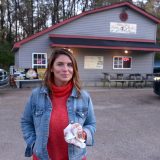Vivian Howard used to think that her hometown of Deep Run, NC couldn’t support the dreams she had, but now says she couldn’t have achieved success without having family at arms reach. Drawn back home from New York, she lives across the road from her parents, who she counts on for constructive criticism about the meals she serves at her restaurants and her appearances on TV.
With her latest show “Somewhere South,” Howard travels beyond Deep Run and Eastern North Carolina to learn about shared Southern food traditions, from the many different ways to cook collards to the universality of porridges like grits and oatmeal. She recently spoke with Christopher Kimball on Milk Street Radio about summers at work on the family farm, the most important takeaways from filming the show and the wide world of stewed greens. Get a taste of the interview from the excerpts below, and listen to the full interview on our website or via Apple Podcasts.
On summers working on the family farm
I grew up on my parent’s tobacco farm, and that's what our summer was all about. It was tobacco season. I lived 50 minutes from the beach and I never remember going to the beach until I was in sixth grade because the whole family went to work, topping and suckering and burning the tobacco. And then tobacco went away. My parents transitioned and became hog farmers. They grow grain that feeds the hogs primarily, so that's a whole other look at agriculture. I am a unicorn in this world, because I come from that sort of farming background but I have a farm-to-table restaurant and have been a champion of small farmers. I understand both worlds from a unique perspective.
On discovering shared food traditions
We spent several days in Clarkston, Georgia, which is one of the most diverse square miles in the nation. It's become a haven for refugees from all over the world and we spent time with a group of female refugees from Burundi. I went to this woman's home and she was going to show us how to pound and cook cassava leaves. She made this huge feast and I hardly recognized the ingredients on the table, but the the way in which we were eating was what I would consider incredibly Southern. We had this pot of very highly seasoned stewed greens that cooked for a long time. We had a starch which, in her kitchen, was fufu. In my own, it would have been cornbread. We had a platter of braised meat that was kind of messy looking but really delicious. It was so beautiful to really understand how our food traditions that we bring with us to wherever we land are shaped by where we land, and how that place where we land and settle is then shaped by those food traditions.
On porridge
I think porridge is a cooked grain that absorbs many types of liquids. I think often it's a cracked grain. It's definitely comfort food. It's frugal food. It's morning food, it's night food, it’s substance. Porridge is something that exists in every culture, in every community.
On turnip run-ups and Southern greens
A turnip run-up is the second coming of a turnip plant or a mustard plant without an edible taproot. It's confusing down here because we call a lot of things turnip greens that are not actual turnips with the taproot. The run-up looks a bit like broccoli rabe with a little floret. It's very tender and juicy and just has a very distinct early spring taste. It's a delicacy of this region. We have a lot of words for greens that don't make a lot of sense outside of this place. Turnip greens, mustard greens, any kind of stewing green–we call it salad. People will go to the market and say that they want a mess of salad. That means they're going to pick a little bit of turnip, a little bit of mustard, mixing what they think will make the perfect pot of greens.
On returning to home in Deep Run, NC
When I started considering coming back here, I said to my parents, you know, I don't know why you would have given me every opportunity in the book and believe that I would move back to Deep Run, North Carolina. I just didn't think that this place would be able to support the dreams that I had. But what I have figured out is that I really could not have done what I've done without my family in my backyard, without my mom coming over to tell me that my hair looked awful on TV last night, or that her dinner at the restaurant was too salty. I think that having my family close and having them in my life and in my presence has really been a grounding force for both me and my children. I've learned that place does not have to determine the quality and the reach of your work. We move so often for work and let that dictate where we settle. Maybe we should move for love and surround ourselves with the people we care about. I'm not rooted to the soil of Deep Run. I'm rooted to the people around me.
Quotes have been edited for clarity.
See here for more from Milk Street Radio, and join the conversation on Facebook, Twitter, Instagram and Pinterest.



